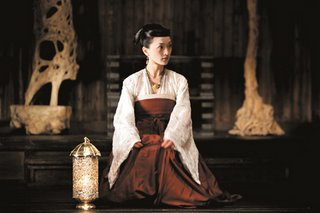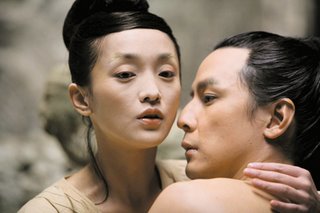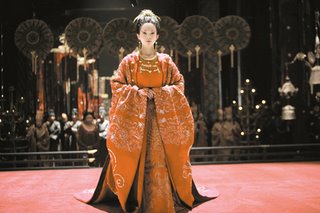Tim Yip offers visual feast in designs for 'The Banquet'
By Andrew C.C. Huang
Taiwan News, Contributing Writer
Page 1
2006-09-01 02:30 AM

To emphasize the innocence of Zhou Xun's character Qing Nu, Tim Yip designed simple dresses composed of block colors without too many ornaments, such as this white top dress wrapped by a long burgundy skirt.
Tim Yip Productions

Tim Yip says his creations for "The Banquet" has a "Tang dynasty meets ancient Europe" feel.


For most moviegoers, the name Tim Yip is associated with the ravishingly beautiful and elaborately designed costumes of the landmark epic "Crouching Tiger, Hidden Dragon." Yip received double nominations at the Oscars for both costume design and art direction and won in the costume category, forever linking his name to the grandeur of the dynastic and classical China in the audience's minds.
However, there's more than one trick up Yip's sleeves. Since "Crouching Tiger," Yip has moved on to design the grass-root Taoist cult costumes and the creepy dilapidated temple within a Taipei high-rise in Columbia Asia's horror blockbuster "Double Vision." He went on to perform the minimalist and Zen-themed costumes and stage design for Nobel laureate Gao Xinjiang's first ever opera "Snow in August." After that came the surrealism-meets-installation art in China master Chen Kaige's fantasy kungfu epic "The Promise."
On September 15, we will get to see Yip's latest esthetic firework in China master Feng Xiaogang's costume drama "The Banquet" inspired by Shakespeare's "Hamlet." No doubt jumping on the bandwagon of the global kungfu rage, "The Banquet" incorporates martial-arts scenes orchestrated by none other than action choreographer Yuen Ho Ping of "The Matrix" and "Kill Bill" fame.
However, as a period drama inspired by "Hamlet," Feng's "The Banquet" is undisputedly a serious drama at its heart and requires visual schemes to accentuate its dramatic gravity. To meet this end, Yip pulls off his design wonder splendidly yet again.
"I try to create a style by blending elements from western and Asian arts for 'The Banquet'," says Tim Yip in an exclusive interview with Taiwan News. "I use late Tang style for the costumes and then add in elements of the Renaissance painting for setting design."
"The dominant color is the serene dark-brown as seen in the oil paintings from the Renaissance era. Then I add the elements of red and gold to brighten it and make the visuals more interesting," adds Yip.
Although the drama is inspired by "Hamlet," director Feng shifts the focus of the story and adds a few characters from other Shakespearean plays. China superstar Zhang Ziyi portrays a Lady Macbeth-esque Empress Wan, a woman consumed with ambition, greed and desires. China actor Ge You portrays Emperor Li, whose throne is in serious danger. Hong Kong star Daniel Wu portrays Prince Wu Luan, torn between his obligation to the dynasty and his desire for an artist's carefree life. China star Zhou Xun portrays the naive ingenue Qing Nu, whose love for Prince Wu Luan is unrequited. Chinese actor Huang Xiaoming portrays Qing Nu's elder brother, an ambitious general who becomes entangled in the imperial court assassinations.
Tang dynasty standards
The story of "The Banquet" takes place in the late Tang period. With his firm grasp of China's esthetic history, Yip designs a series of elegant costumes that both convey the grandiosity of the strong Tang dynasty and the scheming and treacherous themes of the story.
"The beauty standards of the Tang dynasty were in favor of voluptuous women," Yip explains. "Both Zhang Ziyi and Zhou Xun are extremely slim. In order to project the ideas of beauty for these two characters for the modern audiences, I decided to skew historical accuracy and not demand that they gain weight for the roles. However, I did design costumes with layers and with decorative accessories to enhance their bodily presence."
Zhang, who is 29, takes on what is probably the most challenging role of her career by portraying an empress who is torn by greed, desire, self doubt and insecurity. To make Zhang appear older without resorting to wrinkle make-up, Yip decided to shave off the ends the Zhang's eyebrows to achieve an older look.
"I'm very impressed by how much Ziyi has grown and her professionalism," says Yip. "As soon as I brought up the ideas of shaving off the ends of her brows for effect, she accepted the idea without any hesitation."
For the pivotal part of Empress Wan, Yip designated a color scheme to convey her different emotional stages.
The movie begins with the death of the emperor and with Empress Wan in mourning. Zhang wears a simple-lined, long beige mourning gown with long coat tail with hints of innocence and romance. "It's in the beginning of the movie when Empress Wan is still innocent and doesn't realize her husband was assassinated," says Yip.
In order to protect herself, the widowed Empress Wan accepts the marriage proposal by Li, the new emperor who killed his younger brother in order to overtake the throne.
During this wedding ceremony, Zhang wears a regal and elegant scarlet gown. The outer gown is a lavish red overcoat with wide sleeves and white embroidery with an inner red dress lined by gold embroidery accessorized with a drapery-like gold necklace. Zhang's coiff is a simple pull-back bun with classic and flower-blossom shaped gold headset and gold earrings. Her face is painted Tang dynasty white with the lips' center tinged red in Tang style. Modern elements are injected with Zhang's eyes' ends painted with rouge powder into dramatic triangular shapes and her shaved shorted brows painted in red too. Zhang wears this extravagant red gown in the finale of "The Banquet" again.
As an empress, Wan's daily gowns are beautifully designed and elaborately crafted lavish gowns that befit the status of an empress. There are two variations of her daily gowns. One is a long-sleeved black gown with elaborate gold-and-brown embroidery with circular motif at the coat's collar with a brown embroidered inner dress. Another variation is a long-sleeved beige gown with gold embroidery and a simple-lined beige inner dress. For Empress Wan's daily wear image, Zhang's hair is pulled back and woven into intertwining sculptural buns at the back and with floral-motif gold headset and earrings. Her face is treated with naturalistic skin-tone makeup, black brows and less dramatic lipstick color for a more spontaneous look.
"Ziyi's character is full of conflicting motives," explains Yip. "She is forced by circumstances to accept the marriage proposal from the new Emperor Li in order to save her own life and maintain her empress status. She hates Li, yet she gets sexual satisfaction from him."
Zhou Xun's character Qing Nu is the minister's young aristocratic daughter who falls in love with Prince Wu Luan. Simplicity is the central driving theme for Qing Nu's image. As the minister's daughter, Qing Nu wears classy and well-crafted dresses in her daily life. To convey her character's naivete and purity, Qing Nu's dresses are clean and simple, composed of block colors without too many ornaments. One of her dresses is a white top dress wrapped by a burgundy long skirt when she appears for the first time in the beginning of the movie to perform a dance. Another dress - a piece of tasteful and simple-lined pale-green dress adorned with a green jade necklace - echoes her name Qing Nu, which in Chinese literally means "green girl."
"For Empress Wan and Qing Nu, I borrowed the esthetics found in 16th century European aristocratic ala 'Dangerous Liasons'," Yip expains. "I painted Ziyi and Zhou Xun's faces white to convey the kind of wan yet sexy beauty. I also painted red eye shadow on Ziyi's eyelids and green powder on Zhou Xun's eyebrows to highlight their characters' personalities."
Hong Kong star Daniel Wu portrays Crown Prince Wu Luan, a man without political ambitions who craves a free artistic life outside of the imperial court. While Qing Nu has a deep love for him, his heart belongs to his young stepmother Empress Wan. As a wavering prince based on the character Hamlet, Prince Wu Luan is torn between life choices and meets the sad end not unlike Hamlet. For this character, Yip designed an elaborately embroidered blue court gown as his daily wear in the imperial court. A simple white dress in rough fabric serves as his daily wear in his later exile days.
European-inspired armor
China actor Ge You portrays the pivoting part as the ambition-driven and malicious Li who kills his older brother to become emperor. This role's dramatic importance is only secondary to Zhang Ziyi's Empress Wan. In the beginning of the movie, Ge appears in an armor suit with European motif. Later on throughout the movie, he becomes Emperor Li and always wears the lavishly crafted and regal emperor's royal gowns with red and gold as the dominant decorative motif.
"Ge You has the same problem as Ziyi and Zhou Xun. He is very skinny in person," says Yip. "I have to design costumes with layers of clothing, wide shoulder and sleeves and decorative accessories in order to build the illusion of a strong physical presence."
Chinese actor Huang Xiaoming portrays the minister's son and the general. As a China first-string TV actor who has portrayed roles such as chivalrous swordsman and emperor, Huang has a solid build and swarthy features. His physical appearance makes him a natural fit for the role of the general. "I designed armor suit with European motif for him," says Yip.
The Western style elements mostly appear as backdrop in the settings and the movie's dark-toned feel as seen in old-school European paintings. For the climax scene where various courtly camps carry out their assassinations plans at the extravagant banquet, Yip designed and commissioned the largest film set ever built in China, a whopping 120,000 square feet banquet hall. "This kind of massive court is more reminiscent of the European masquerade dance hall style rather than the traditional compact and private dinner halls of the Chinese imperial court," says Yip.
"The imperial stage background where Empress Wan and Emperor Li sit has a very European feel. I employ two circular fans with green peacock feathers in the middle as the visual focus. Behind them is a gargantuan Art Nouveau style floral winding sculptural piece that serves as the stage background."
Over all, I'm satisfied with another new esthetic attempt and the result of this 'Tang dynasty meets ancient Europe' style," Yip concludes.
"The Banquet" opens in greater China on September 15.
By Andrew C.C. Huang
Taiwan News, Contributing Writer
Page 1
2006-09-01 02:30 AM

To emphasize the innocence of Zhou Xun's character Qing Nu, Tim Yip designed simple dresses composed of block colors without too many ornaments, such as this white top dress wrapped by a long burgundy skirt.
Tim Yip Productions

Tim Yip says his creations for "The Banquet" has a "Tang dynasty meets ancient Europe" feel.


For most moviegoers, the name Tim Yip is associated with the ravishingly beautiful and elaborately designed costumes of the landmark epic "Crouching Tiger, Hidden Dragon." Yip received double nominations at the Oscars for both costume design and art direction and won in the costume category, forever linking his name to the grandeur of the dynastic and classical China in the audience's minds.
However, there's more than one trick up Yip's sleeves. Since "Crouching Tiger," Yip has moved on to design the grass-root Taoist cult costumes and the creepy dilapidated temple within a Taipei high-rise in Columbia Asia's horror blockbuster "Double Vision." He went on to perform the minimalist and Zen-themed costumes and stage design for Nobel laureate Gao Xinjiang's first ever opera "Snow in August." After that came the surrealism-meets-installation art in China master Chen Kaige's fantasy kungfu epic "The Promise."
On September 15, we will get to see Yip's latest esthetic firework in China master Feng Xiaogang's costume drama "The Banquet" inspired by Shakespeare's "Hamlet." No doubt jumping on the bandwagon of the global kungfu rage, "The Banquet" incorporates martial-arts scenes orchestrated by none other than action choreographer Yuen Ho Ping of "The Matrix" and "Kill Bill" fame.
However, as a period drama inspired by "Hamlet," Feng's "The Banquet" is undisputedly a serious drama at its heart and requires visual schemes to accentuate its dramatic gravity. To meet this end, Yip pulls off his design wonder splendidly yet again.
"I try to create a style by blending elements from western and Asian arts for 'The Banquet'," says Tim Yip in an exclusive interview with Taiwan News. "I use late Tang style for the costumes and then add in elements of the Renaissance painting for setting design."
"The dominant color is the serene dark-brown as seen in the oil paintings from the Renaissance era. Then I add the elements of red and gold to brighten it and make the visuals more interesting," adds Yip.
Although the drama is inspired by "Hamlet," director Feng shifts the focus of the story and adds a few characters from other Shakespearean plays. China superstar Zhang Ziyi portrays a Lady Macbeth-esque Empress Wan, a woman consumed with ambition, greed and desires. China actor Ge You portrays Emperor Li, whose throne is in serious danger. Hong Kong star Daniel Wu portrays Prince Wu Luan, torn between his obligation to the dynasty and his desire for an artist's carefree life. China star Zhou Xun portrays the naive ingenue Qing Nu, whose love for Prince Wu Luan is unrequited. Chinese actor Huang Xiaoming portrays Qing Nu's elder brother, an ambitious general who becomes entangled in the imperial court assassinations.
Tang dynasty standards
The story of "The Banquet" takes place in the late Tang period. With his firm grasp of China's esthetic history, Yip designs a series of elegant costumes that both convey the grandiosity of the strong Tang dynasty and the scheming and treacherous themes of the story.
"The beauty standards of the Tang dynasty were in favor of voluptuous women," Yip explains. "Both Zhang Ziyi and Zhou Xun are extremely slim. In order to project the ideas of beauty for these two characters for the modern audiences, I decided to skew historical accuracy and not demand that they gain weight for the roles. However, I did design costumes with layers and with decorative accessories to enhance their bodily presence."
Zhang, who is 29, takes on what is probably the most challenging role of her career by portraying an empress who is torn by greed, desire, self doubt and insecurity. To make Zhang appear older without resorting to wrinkle make-up, Yip decided to shave off the ends the Zhang's eyebrows to achieve an older look.
"I'm very impressed by how much Ziyi has grown and her professionalism," says Yip. "As soon as I brought up the ideas of shaving off the ends of her brows for effect, she accepted the idea without any hesitation."
For the pivotal part of Empress Wan, Yip designated a color scheme to convey her different emotional stages.
The movie begins with the death of the emperor and with Empress Wan in mourning. Zhang wears a simple-lined, long beige mourning gown with long coat tail with hints of innocence and romance. "It's in the beginning of the movie when Empress Wan is still innocent and doesn't realize her husband was assassinated," says Yip.
In order to protect herself, the widowed Empress Wan accepts the marriage proposal by Li, the new emperor who killed his younger brother in order to overtake the throne.
During this wedding ceremony, Zhang wears a regal and elegant scarlet gown. The outer gown is a lavish red overcoat with wide sleeves and white embroidery with an inner red dress lined by gold embroidery accessorized with a drapery-like gold necklace. Zhang's coiff is a simple pull-back bun with classic and flower-blossom shaped gold headset and gold earrings. Her face is painted Tang dynasty white with the lips' center tinged red in Tang style. Modern elements are injected with Zhang's eyes' ends painted with rouge powder into dramatic triangular shapes and her shaved shorted brows painted in red too. Zhang wears this extravagant red gown in the finale of "The Banquet" again.
As an empress, Wan's daily gowns are beautifully designed and elaborately crafted lavish gowns that befit the status of an empress. There are two variations of her daily gowns. One is a long-sleeved black gown with elaborate gold-and-brown embroidery with circular motif at the coat's collar with a brown embroidered inner dress. Another variation is a long-sleeved beige gown with gold embroidery and a simple-lined beige inner dress. For Empress Wan's daily wear image, Zhang's hair is pulled back and woven into intertwining sculptural buns at the back and with floral-motif gold headset and earrings. Her face is treated with naturalistic skin-tone makeup, black brows and less dramatic lipstick color for a more spontaneous look.
"Ziyi's character is full of conflicting motives," explains Yip. "She is forced by circumstances to accept the marriage proposal from the new Emperor Li in order to save her own life and maintain her empress status. She hates Li, yet she gets sexual satisfaction from him."
Zhou Xun's character Qing Nu is the minister's young aristocratic daughter who falls in love with Prince Wu Luan. Simplicity is the central driving theme for Qing Nu's image. As the minister's daughter, Qing Nu wears classy and well-crafted dresses in her daily life. To convey her character's naivete and purity, Qing Nu's dresses are clean and simple, composed of block colors without too many ornaments. One of her dresses is a white top dress wrapped by a burgundy long skirt when she appears for the first time in the beginning of the movie to perform a dance. Another dress - a piece of tasteful and simple-lined pale-green dress adorned with a green jade necklace - echoes her name Qing Nu, which in Chinese literally means "green girl."
"For Empress Wan and Qing Nu, I borrowed the esthetics found in 16th century European aristocratic ala 'Dangerous Liasons'," Yip expains. "I painted Ziyi and Zhou Xun's faces white to convey the kind of wan yet sexy beauty. I also painted red eye shadow on Ziyi's eyelids and green powder on Zhou Xun's eyebrows to highlight their characters' personalities."
Hong Kong star Daniel Wu portrays Crown Prince Wu Luan, a man without political ambitions who craves a free artistic life outside of the imperial court. While Qing Nu has a deep love for him, his heart belongs to his young stepmother Empress Wan. As a wavering prince based on the character Hamlet, Prince Wu Luan is torn between life choices and meets the sad end not unlike Hamlet. For this character, Yip designed an elaborately embroidered blue court gown as his daily wear in the imperial court. A simple white dress in rough fabric serves as his daily wear in his later exile days.
European-inspired armor
China actor Ge You portrays the pivoting part as the ambition-driven and malicious Li who kills his older brother to become emperor. This role's dramatic importance is only secondary to Zhang Ziyi's Empress Wan. In the beginning of the movie, Ge appears in an armor suit with European motif. Later on throughout the movie, he becomes Emperor Li and always wears the lavishly crafted and regal emperor's royal gowns with red and gold as the dominant decorative motif.
"Ge You has the same problem as Ziyi and Zhou Xun. He is very skinny in person," says Yip. "I have to design costumes with layers of clothing, wide shoulder and sleeves and decorative accessories in order to build the illusion of a strong physical presence."
Chinese actor Huang Xiaoming portrays the minister's son and the general. As a China first-string TV actor who has portrayed roles such as chivalrous swordsman and emperor, Huang has a solid build and swarthy features. His physical appearance makes him a natural fit for the role of the general. "I designed armor suit with European motif for him," says Yip.
The Western style elements mostly appear as backdrop in the settings and the movie's dark-toned feel as seen in old-school European paintings. For the climax scene where various courtly camps carry out their assassinations plans at the extravagant banquet, Yip designed and commissioned the largest film set ever built in China, a whopping 120,000 square feet banquet hall. "This kind of massive court is more reminiscent of the European masquerade dance hall style rather than the traditional compact and private dinner halls of the Chinese imperial court," says Yip.
"The imperial stage background where Empress Wan and Emperor Li sit has a very European feel. I employ two circular fans with green peacock feathers in the middle as the visual focus. Behind them is a gargantuan Art Nouveau style floral winding sculptural piece that serves as the stage background."
Over all, I'm satisfied with another new esthetic attempt and the result of this 'Tang dynasty meets ancient Europe' style," Yip concludes.
"The Banquet" opens in greater China on September 15.

Comments